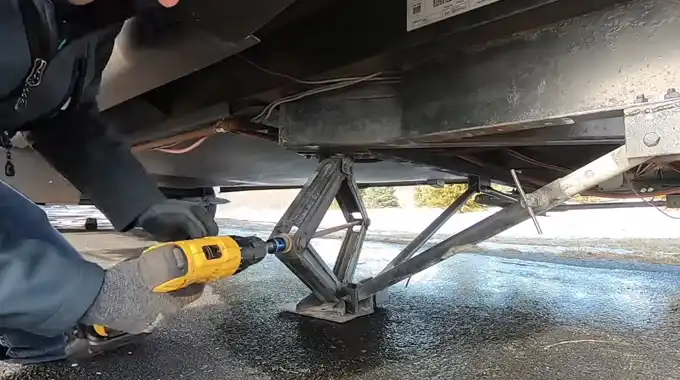Last Updated on April 19, 2023
When you park your RV or travel trailer on stabilizer jacks and move around inside, you may feel some shifting. Once you determine the cause, you may notice that your stabilizer jacks are backing off.
The jacks may loosen over time due to vibration from travel. It is also possible for the ground beneath the RV to shift, causing the jacks to become loose. You need to know the solution on how to keep rv stabilizer jacks from backing off.
There are a few things that you can do to make sure your stabilizer jacks stay in place. One method is to use leveling blocks. We will discuss that method and a few others below so you can choose the one depending on the situation.
How to Keep RV Stabilizer Jacks from Backing Off – Things to Do
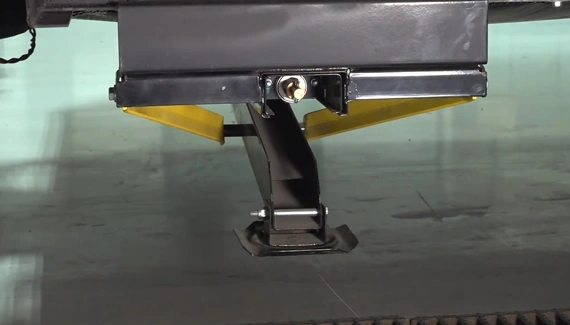
If you experience your stabilizer jacks backing off, you must take action to prevent them from doing so. You have a few options depending on the cause of the issue. The guidance provided below will assist you in preventing RV stabilizer jacks from backing out.
1. Use Leveling Blocks or Jack Pads
If you are parked on soft ground or notice that the ground beneath your RV has shifted, your stabilizer jacks may become uneven. This can cause them to back and slide out.
You can use jack pads or leveling blocks under the stabilizers to prevent this from happening. Leveling blocks and jack pads will help to keep the jacks from sinking into the ground and backing out.
There are different sizes and types of leveling blocks available. Some are made of plastic, and others are made of wood. The type of material that the leveling block is made of will determine how well it grips the ground and how strong it is.
The vast majority of RV jack pads are made from either industrial-strength engineered thermoplastic or a heavy-duty, UV-stabilized polymer. These materials are chosen for their durability and resistance to the elements.
In particular, they are designed to withstand the rigors of long-term exposure to sun and rain. The jack pad must also be able to support the weight of the RV, so it must be strong enough to bear the load without breaking or bending.
To use the leveling blocks or jack pads, place them under the stabilizer jacks. Make sure that the blocks or pads are level so that the jacks will not sink into the ground and back off.
After the blocks or pads are in place, lower the jacks onto them. The blocks or pads will act as a buffer between the ground and the jacks and help keep the jacks level.
Tighten the knob on the jack to secure it in place. You need to repeat this process for all four jacks. Following these simple steps, you can keep your stabilizer jacks from backing out.
2. Use Wheel Chocks
If you are parked on a slope or an uneven surface, your RV may roll. This can cause the stabilizer jacks to become loose and back out. To prevent this from happening, you can use wheel chocks.
Wheel chocks are designed to keep your RV from rolling. They are placed behind and in front of the tires on both sides of the RV. Once the chocks are in place, your RV will not be able to roll, and the stabilizer jacks will not become loose.
To use wheel chocks, simply place them against the tires and then lightly tap them into place with a hammer. Make sure that the chocks are snug against the tires so that they will not move. Consequently, your RV or toy hauler will be prevented from rolling, and your stabilizer jacks will be prevented from returning to their original positions.
3. Tighten Nuts and Bolts with a Wrench if Loose
The nuts and bolts that secure the stabilizer jack to the RV can become loose over time. This can cause the jack to back out. You need to check the nut and bolt periodically to prevent this from happening.
If the nut and bolt are loose, tighten them with a wrench. Our team reviewed the top-rated cordless drill for RV jacks, considering crucial features such as material, RPM, battery backup, and weight.
Ensure that the nut and bolt are in good condition as well. If they have deteriorated, you should replace them with new ones. Make sure to check the condition of all four nuts and bolts. In this manner, stabilizer jacks can be kept from backing out.
4. Use Lock Washers
You can use lock washers if bolts and nuts securing stabilizer jacks become loose. Lock washers are designed to keep nuts and bolts from becoming loose. They work by biting into the bolt and nut and preventing them from turning.
This will keep the stabilizer jack from backing out. To use lock washers, simply put them on the bolt and nut before tightening them. The lock washer will bite down on the bolt and nut and keep them from becoming loose.
5. Use a Locking Pin
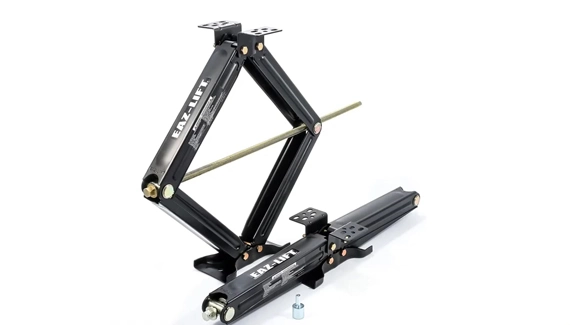
For an additional level of security, you can use a locking pin. A locking pin is inserted through the bolt and nut to keep them from becoming loose. This will prevent the stabilizer jack from backing out.
To use a locking pin, simply insert it into the notch and turn it until it locks into place. Once the pin is locked, your stabilizer jacks will be secure, no matter how much you move around.
So next time you hit the road, be sure to bring along some locking pins to keep your RV stabilizer jacks from backing off.
6. Check the Condition of the Jacks
You should also check the condition of the stabilizer jacks periodically. This is because they can become damaged over time. The most common type of damage is corrosion. Corrosion can cause the jacks to become weak and eventually break.
It is important to inspect the jacks regularly for signs of corrosion in order to prevent this from happening. If you see any, you should sand the area down to bare metal and apply a primer coat.
Once the primer is dry, you can paint the jack with corrosion-resistant paint. You should also lubricate the jacks periodically to prevent corrosion. Using dry lubricant is a good way to protect the jacks from corrosion. The main benefit of dry lubricant is that it does not attract contaminants. This will keep the jacks clean and free from corrosion.
What Size Leveling Block Should You Use to Avoid RV Stabilizer Jack Backing Up?
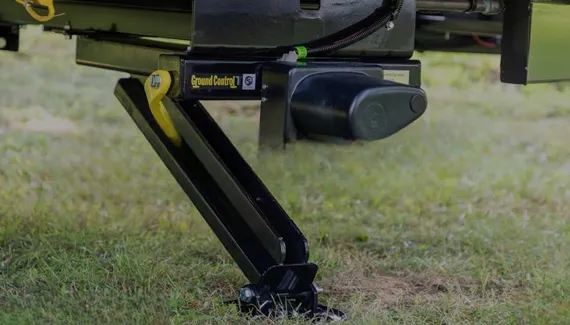
The size of the leveling block will depend on the size of your RV stabilizer jack and the surface on which you are placing it. Leveling block sizes are typically measured in inches.
Generally, 8.5-inch, 10-inch, and 12-inch blocks are the most common sizes. The 8.5-inch and 10-inch blocks are typically used on concrete surfaces, while the 12-inch blocks are used on gravel or dirt surfaces.
If you are unsure about what size block to use, you can always consult the RV stabilizer jack manufacturer’s instructions.
What to Consider When You Store An RV With Jacks Down or up?
Several factors need to be taken into consideration before storing an RV with its jacks down or up, including:
RV Storage Period
When selecting an appropriate RV storage solution, the length of time you plan to store your RV should be considered. If you know you will only store your vehicle for a short period, such as a few days or less, you can keep it with the jacks up.
But, if you’re going to store it for an extended period, then it is recommended that you keep it with the jacks down to prevent any unnecessary damage. Also, if you plan on storing your RV for longer periods, such as over the winter, you will want to look into covered storage solutions that
Frequency of RV Use
Another thing to consider when deciding how to store an RV (jacks down or up) is how often the vehicle will be used during storage. If you plan to use your RV frequently during its storage stay, you don’t have the RV jack down.
However, if you plan on leaving the vehicle for longer than a few months, you should consider putting down the jacks to prevent any potential damage from occurring. Also, it is best to use leveling blocks or an RV jack pad designed specifically for RVs to ensure the vehicle isn’t damaged.
RV Storage Location
The location of the storage facility is also essential to consider when determining how best to store your RV with jacks down or not, as this can significantly impact factors such as security, accessibility, cost, etc.
For instance, some locations may provide extra protection from the elements but charge more for secure storage. Also, some sites can provide easy access to your RV but may not be as secure as others.
Type of Surface
Another factor worth considering when storing an RV with jack up or down is whatever ground surface type is available at your chosen facility. This can affect levels and maintenance considerations depending on which one is selected.
Generally speaking, concrete surfaces are better at providing stability with RV jacks down which helps prevent slippage or shifting during storms or other inclement weather conditions. In contrast, gravel surfaces typically allow for more flexibility with RV jacks up.
Weight Distribution
When determining whether you should keep the RV with jacks down or up, weight distribution is one of the critical factors. Keeping an RV with the jacks down can help distribute the weight evenly throughout the vehicle and prevent sagging in areas where too much pressure has been applied for long periods.
If you store your RV for extended periods, additional jack stands (such as scissor jack) can help reduce stress on specific points by providing even more support and displacement from ground-level contact points.
Area Climate
The climate in which you are storing your RV will also impact whether or not you should leave the jacks down or up while storing it.
For instance, if you are in a dry climate without much rain or moisture, then leaving the jacks down might be a better choice. This will help keep air moving beneath your vehicle, preventing corrosion from occurring on any of the parts that may be exposed to moisture while stored upright.
Manufacturer Recommendations
Finally, it is always important to check with your specific recreational vehicle’s manufacturer before deciding whether to store it with jacks down or up for prolonged periods. Different travel trailer manufacturers have different specifications, and some may require only storing specific models upright.
In contrast, others may suggest leaving them down depending on climate conditions and other environmental factors specific to where you are storing them. Following these recommendations closely can help ensure you do not damage any parts of your recreational vehicle.
Why Do You Need to Store an RV With Jacks Down?
Although many people typically store their Recreational Vehicle (RV) with the jacks up, leaving your RV on its tires for long periods is not recommended. This is because there are several risks associated with doing this.
Uneven Weight Distribution
Storing a recreational vehicle with the jacks up can cause uneven weight distribution due to concentrated pressure, which causes certain parts of the chassis to take more weight than intended.
This may lead to a warped or cracked frame and permanent damage that will be costly and irreparable. To prevent this, you should store your RV with the jacks down.
Flat Spots on Tires
Another downside of storing the RV with its jacks up is that it can cause flat spots on tires due to prolonged pressure from standing in one position for too long.
Tire wear increases significantly when there are flat spots compared to regularly inflated tires, and replacing them will be necessary if they are not used often enough.
Use extra stabilizer jacks when parking your RV for extended periods to prevent this issue, so your tires don’t experience any unnecessary pressure or wear and tear over time.
Damage to the Leveling System
Storing your RV with its jacks-up may also create issues with its leveling system since it will be under constant strain, leading to damage or breakage over time. Also, if the vehicle moves at all while stored this way, there could be a potential catastrophic failure due to increased stress.
Potential for Jack Failure
Another significant risk associated with RVs stored with their jacks up is that they might fail due to corrosion buildup caused by extended exposure to the elements.
Corrosion caused by either freezing oil or moisture inside the jacks will weaken them, leading to a break in the system and causing significant damage if left unchecked.
To prevent this issue, you should store your RV with its jacks down so they are not exposed to the elements while parked for an extended period. Also, using preventive measures, such as using jack pads for RV jacks explicitly designed for RVs, can help prevent damage.
Damage to the Campsite
Storing an RV with its jacks up can also cause damage to the campsite surface due to the vehicle’s weight.
This is especially true if you’re camping in an area with soft soil, such as sand or clay, which can become compacted and cause long-term damage to the area. This could create a mess and make it difficult for other campers to enjoy their stay.
It could lead to uneven settling around the RV, which may cause tripping hazards and other safety concerns for campers. Ensure your RV’s jacks are placed on solid concrete blocks or wood planks to avoid this damage.
How Often Should You Check the RV Stabilizer Jacks?
The frequency with which you check the jacks will depend on how often you use your RV and how rough the terrain is that you are driving on. You can probably check the RV leveling jacks once a month if you drive on smooth roads.
When driving on rougher roads, you should inspect them every week or two. If you notice any looseness in the jacks, then you should check them immediately to prevent further damage.
How Tight Should Travel Trailer Stabilizer Jacks Be to Avoid Backing Out?
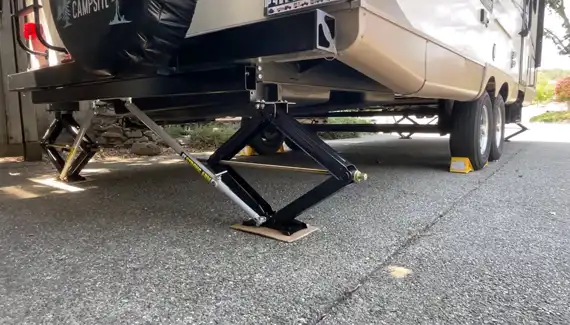
The travel trailer stabilizer jacks should be tight enough to provide support but not so tight that they are hard to turn. If the jacks are too loose, they may back out and cause your trailer to become unlevel.
When the jacks are too tight, the threads are likely to be weakened, making it difficult to turn them. The jacks should be tightened to the appropriate level in order to avoid these problems. To determine the appropriate level of tightness, use a torque wrench to tighten the jacks until the desired resistance level is reached.
Do not overtighten the jacks, as this may damage them. You can also refer to the instructions provided by the RV stabilizer jack manufacturer to find the appropriate degree of tightness.
How High Can I Stack RV Leveling Blocks to Avoid Jack Backing Out?
It is not recommended to stack the RV leveling blocks too high. In general, leveling blocks are approximately one inch high. If you stack them too high, they may become unstable and cause your RV or fifth wheel trailer to become unlevel.
If you wish to prevent the RV stabilizer jacks from backing out, you should stack the RV leveling blocks at a maximum height of four inches. This will provide sufficient support without making the stack too unstable.
Enjoy Stable RV Stabilizer Jacks
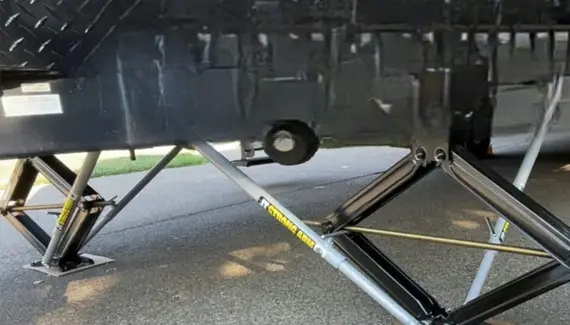
We hope that you now understand how to keep rv stabilizer jacks from backing off. If you follow the tips discussed in this article, you can avoid this problem and keep your RV level. Make sure to check the jacks regularly and to use the appropriate size leveling blocks.
Do not stack the blocks too high, and tighten the jacks to the appropriate level. Also, don’t forget to keep the jacks lubricated periodically to prevent corrosion. Ensure that the lubricant you use does not attract loose particles so that the jacks stay clean. When you have completed all of these steps, your RV stabilizer jacks will be stable and will not back out.
